Hallucinations, a blog about writing, trains, and Wire to Wire
Browsing Category: Wire to Wire
New York, Sucker Lake, Michigan
Timing is everything. After months of working on the new book, I’m psyched to be hitting the road again for W2W, especially since the road is taking me to NY, Michigan, and my adopted hometown of Sucker Lake (which in a way, I guess, isn't really the road. But you know what I mean.)
As April begins, I’ll be taking part in the butt-kicking Animal Farm Reading Series, which is held monthly at Public Assembly in Brooklyn. The reading organizers like to point out that all reading series are created equal, but some are more equal than others. In any case, I’m thrilled to have been invited. On April 3, I’ll be reading with Bernice L. McFadden and Eliza Factor.
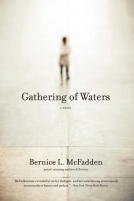

Gathering of Waters by Bernice L. McFadden & The Mercury Fountain by Eliza Factor.
A couple weeks later, I get to do the first W2W event in Lake Oswego, Oregon, which I sometimes call Sucker Lake to honor the lake’s original name. (It was named after the fish, not for the people who fell for the advertising slogan “Live Where You Play” and built their mansions on its edge.)
I’ve lived in Lake O for twenty years, wrote most of W2W in the tree house here, and yet am best known for being the father of Zane Sparling, former prodigy/humor columnist for the Lake Oswego Review. (True story: A couple weeks ago I was mailing off a copy of W2W at the Lake Oswego post office, or the LOPO as some of us call it, when a stranger saw the book and asked if I was Scott Sparling. I was getting set to autograph her hoody when she told me how much she liked Zane’s writing.) In any case, I’ll be at the LO Public Library on April 17. Maybe I can convince Zane to come.

A few nights later, on April 20, I’ll join fellow Tin House writer Alexis Smith along with Jean Auel, Emily Chenoweth, Loren Christensen, Ted Coonfield, Kim Cooper Findling, April Henry, Bart King and Barbara Roberts at HomeWord Bound 2012, a fundraiser for Community Partners for Affordable Housing at the Tualatin Country Club in Tualatin, Oregon.
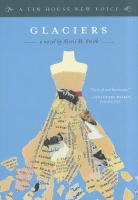
Glaciers by Alexis Smith
Then, Michigan. On April 28, I’ll be in Lansing at the official Library of Michigan for an event that means a lot to me: Notable Nights, the Michigan book awards ceremony honoring the top Michigan books of 2011. It’s an amazing thrill to be on the list along with Jim Harrison, Bonnie Jo Campbell, Michael Moore, Susan Whitall, Keith Taylor, Laura Kasischke, and more.
As part of the Notable Books program, I’ve been invited to read at the Shiawassee District Library in Owosso, Michigan, about an hour north of my biological hometown. I’ll be there on April 30. Seger fans, stop by and we’ll talk music, freight hopping, glue sniffing and anything else that’s on your mind.
Later in June, I’ll be back in Michigan again, including Detroit and a short tour of the Upper Peninsula. Can’t wait for that either.
And to get ready for all this travel: the annual trip to SXSW in Austin later this week with the incomparable Ears Two, well known to Segerfile fans. I’m looking forward to four days of Jon Dee Graham, Chuck Prophet, Alejandro Escovedo, the Black Angels, Justin Townes Earle and dozens of other bands. I’ve already made Jon Dee Graham’s “Laredo” the unofficial theme song of the next book (currently called AUX IN):
I drove home from Laredo, I had the fireflies in my head
They were lighting up a small, dark something.
They were circling round a small, dark something
They were looking for a small, dark something.
-- Jon Dee Graham
If you’re in Brooklyn, Sucker Lake, Seger Nation or Austin, shoot me a tweet or an email, or come out and say hi. It’ll be great to see you the road.
Posted in Music | Wire to Wire
Start with Yes
The Michigan book tour for Wire to Wire covered 2,700 miles over 16 days and was full of amazing moments. I got the rental car stuck in the sand at the edge of the Big Lake. Around midnight in Lansing, I watched a bartendress leap in the air and catch a firefly. And I spent every day with fans (of Wire to Wire and of Seger), friends, and family. Except for the skunk I hit in the last hour of the trip, it couldn’t have been better.
One memorable moment occurred early on at Horizon Books in Traverse City. Given how long I worked on the book, someone asked if the first draft had anything in common with the last. I happened to have grabbed a very early chapter while I was packing, but I hadn’t really looked at it much.
When I opened the folder, I was stunned by the date: 7/15/85 – exactly 26 years and one day prior to the Horizon reading. The chapter is labeled “Comments from Stone Workshop,” because it’s the version I took to the Port Townsend Writers’ Conference. Along with 12 other writers, I was in a weeklong workshop with Robert Stone that year.
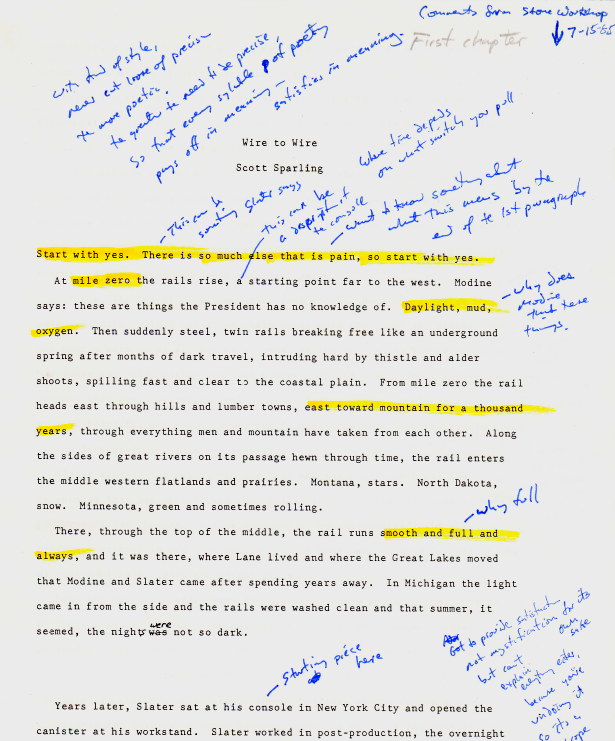
Obviously, as a beginning writer, I focused on rhythm and didn’t worry much about meaning. I wanted to get the sound right. The writing is loud—hewn through time kinda makes me cringe, and who knows what that line about the president means. It's all pretty dramatic. But it’s the beat, not the words, that the two versions have in common. The cadence of the long second paragraph is very close to the feel of Harp’s long, poetic freight rap on page 69 of the finished book.
Fittingly, the only phrase that’s word-for-word the same is “the top of the middle.” In the manuscript and in the book, it refers (rather obliquely) to the upper Midwest states—the top of the middle of the map. But it’s really the name of an Elvin Jones album. In those early days, I used to listen to The Top of the Middle before and while I wrote. To Jones, I think the phrase referred to a place in the beat that he liked the best. In any case, I was clearly more interested in how the syllables fell than in telling a story.
My note at the top of the page records Robert Stone’s reaction: “With this style, never cut loose of precision. The more poetic, the greater the need to be precise, so that every syllable of poetry pays off in meaning.”
It took me a long time to learn how to do that—to the extent that I have—but the Pt. Townsend workshop was the beginning.
The other life lesson I learned at that conference was the old saying, “Beer before whiskey, pretty risky.” After the Horizon reading, I put that wisdom to good use and went straight to the harder stuff. The table was crowded with friends, and the dinner and drinking was as good as it gets.
_______

Drunk on words or just drunk at the Comet Tavern in Seattle, circa 1985: I got a dream, do you wanna be in my dream? Alejandro Escovedo's "Tender Heart."
Posted in Wire to Wire
Your Powell’s Cheat Sheet: 10 Questions
The worst part of any bookstore reading is the moment right after the author says, “I’d be happy to answer any questions.” The painful silence. The awkward attempt to avoid eye contact. I’ve experienced this firsthand. As an audience member, I always feel like I ought to have an intelligent, insightful question at the ready—after all, I’m a fan of whoever’s reading, or I wouldn’t be there. But in the face of that silence, my mind goes blank.
To solve this for you when I read at Powell’s City of Books (Thursday, 7:30 pm, downtown Portland), I’ve prepared the following aid. Just choose any of the questions off the list below and practice them in the bathroom mirror until they feel spontaneous. If you need to write the key words on your hand, that’s fine. No one’s expecting a professional performance. The important thing is to be yourself.
Wire to Wire Questions
1. Is Northern Michigan really that full of losers?
2. How did you learn to ride freights? Would you consider teaching others?
3. What kind of drug is a "Smiling O" exactly, and where can I get some?
4. Did it actually take you 20 years to write Wire to Wire, or would it be more accurate to say that it took the publishing industry 20 years to get around to seeing the value in your book?
5. Which character in Wire to Wire are you most like—Rose or Lane?
6. When robots attack, is it better to respond with logic or brute force? (Wait—skip this. Wrong book.)
7. Do you have any charts and graphs that explain why Wire to Wire is not really a crime novel?
8. Have you secretly designated a well known, contemporary writer as your rival, and has that other writer won any major prizes lately? What does this desperate need for a rival say about you?
9. Wire to Wire has yet to be included on any of those bogus "Best Books of Summer" lists that the mainstream media use to plug books that are already getting tons of publicity and need no further promotion. Does this mean summer might be canceled?
10. Will it seem selfish if I buy multiple copies of Wire to Wire? I'd like to have a spare in case I lose one.
Bonus Question: Is Tin House the coolest publisher in the world, or what?
Better get practicing. See you on Thursday!
_________
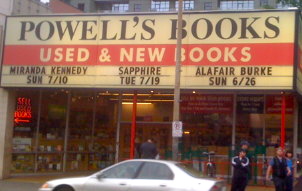
Hey, Mr. Powell's Marquee Man: Put my name up in lights, 'cause it's a miracle I'm standing here today: "Real Mean Bottle" by Bob Seger.
Posted in Wire to Wire
Kicking out the jams
I’ve been guest-blogging on a lot of sites lately. Here are links to some of the places I’ve been.
Powell’s Books – Five posts for Portland’s legendary bookstore.
Book on the Tracks
Is it dangerous? That's the question people ask when they find out I spent a large part of my youth hopping freight trains and traveling in boxcars across the Midwest, through the western U.S., and across Canada. Read more.
Crime and Lowlifes
A friend regrets to inform me that she won't be reading Wire to Wire. Tip: Never say that to a guy who's got a blog. Read more.
Burning Down the House
Imagine a world where sex & money are out of control. Wait - how is that fiction?? Read more.
Saying Thanks
They say I've spent 20 years writing Wire to Wire. Really? That long? I guess it's possible — I lose track of time and get distracted easily. What I do know is that there’s little, maybe nothing, that I've worked at harder in my life. Along the way, many people helped. Here are four you should meet. Read more.
Heavy Music
Made in Michigan — Why Seger's music means so much to me. Read more.
NW Booklovers – Pacific Northwest Booksellers Association
What You Need Most
One summer when I was visiting Michigan, a friend invited me to stay. I'd already spent six weeks in his guest room, gathering material. "Your book's all about Northern Michigan," he said. "Why not just stay here?" Read more.
Largehearted Boy – Book Notes
I remember exactly where I was when I decided to quit my job and write a book: at a Prince concert in Washington state. Can you hear the Purple One change my life in the Tacoma Dome? – "I know, I know times are changing / it's time we all reached out for something new / that means you too." Read more.
WORD bookstore
Scott Sparling, meet NYC.
The first scene of Wire to Wire takes place on 23rd Street in New York. A musician plays “Purple Haze,” but without an amp. I can picture it pretty clearly, but I’ve never actually been to that intersection. Read more.
Shelf Awareness, Book Brahmin – Interview
Q: What books did your high school girlfriend give you?
A: I remember three: The Kama Sutra, Siddhartha and One Flew over the Cuckoo's Nest. I didn't know what to make of the Kama Sutra with all its lingam and yoni stuff. Read more.
My Book, My Movie
I’m stumped. I have no idea who should play the main characters in Wire to Wire. Here’s what I do know. Read more.
What Writers Are Reading
When I finished Wire to Wire, I wanted to catch up on what others in the Northwest were writing. Read more.
The Page 69 Test
Page 69 is actually one of my favorite pages in the book – seriously – and one I almost always include in readings. Read more.
Seattleite Magazine – Interview
"When I was living in Seattle, I read an interview where Dylan said, if you want to create something, go find the electricity. I was working for Seattle City Light, but that was clearly the wrong kind of electricity." Read more.
Book Divas – Ask A New Author
Three rejected titles for Wire to Wire and some good writing advice. Read more.
A social media post on using social media. Read more.
My rejected PR tactics and other advice: Read more.
That's the list for now, but it's bound to grow. While Wire to Wire is on the shelves, I'll be blogging until they make me stop.
___________
.jpg)
Let me up on the stand. And let me "Kick Out the Jams."
Posted in Wire to Wire
The road begins and ends in McMinnville
On a summer night in 1989, the freight-riding careers of Spider Rider and Iron Legs Burk came to an end in McMinnville, Oregon. We were two Michigan kids who lived near the tracks and fell in love with trains in the early ‘70s. We both ended up – or ended up so far – in Oregon.
Nights and weekends, when we were young – when we should have been chasing girls, drinking beer, or stealing cars – we’d steal away to the railroad tracks instead and grab ladder rides. One day, we got in a boxcar and rode a couple hundred miles down to Elkhart, Indiana and back. When I got home, and my parents asked what I'd been up to, I answered, "Hangin' out with Deeg." That was his nickname. Freight stories were shared on a need-to-know basis back then, and our parents didn't need to know. They certainly didn't need to know our freight-hopping names.
After that, we were hooked, and we rode everywhere. Durand, Owosso, St. Paul, East Dubuque, Minot, Havre, Yakima, Spokane, Eureka, Petaluma, San Luis Obispo, Sacramento, Bakersfield, Barstow, Salt Lake City, Santa Fe, Denver, Grand Junction, Omaha – more towns than I can remember, though they're written in our journals. And all across Canada: Kamloops and Moose Jaw and Medicine Hat and…well, the unit trains, the one-a-days, the slugs, and the hotshots. Any train with fresh orders and hoses hooked, we rode.
______
By 1989, things had changed. We both had jobs. Jesse was married and I was about to be. Boxcars were in short supply, replaced by container trains, and empties were rarer still. And we had lost a step or two, or at least I had.
But one day, Jesse – Iron Legs – put out the call, as he always did. One more trip. Portland to McMinnville. Leave work early. Meet me on the bridge. I said yes, as I usually did.
We rode south and west all afternoon and into the evening, and when we jumped out in McMinnville, we might have said something like, "Maybe that’ll be the last time ever." If that's what we said, we probably didn’t really believe it. But here it is, twenty-plus years later, and our freight-riding days seem to be done. You never know, though – we’ll both be in Michigan this summer, and if Jesse sees a slow-moving freight, well...I'll keep you posted. As things stand now, though, McMinnville was the end of the road.
______
So perhaps it's fitting that on June 16, at Third Street Books, McMinnville will be the beginning of the road for the Wire to Wire bookstore tour. Sure, there were a couple of warm-up dates out east last month. I read with a group of terrific Tin House writers at WORD in Brooklyn and the KGB Bar in Manhattan. Good places to loosen up and test things out.

But McMinnville will be the first Oregon date, and the first time I read solo. Not even Iron Legs Burk will be there.
It’s being billed as a workshop/reading, where I’ll tell you everything I know about crime novels, which won’t take long. So if you’re anywhere near Third Street Books in McMinnville, Oregon on June 16, stop in and say hello.
When it’s done, I’m taking a walk down to the freight yard for old time’s sake, and you’re welcome to come along.
_______________

Iron Legs Burk in Oregon: Wanting things that can only be found in the Darkness on the Edge of Town.
Posted in Trains | Wire to Wire
The Strip Club and the Grange
Okay, I didn’t actually do a reading in a strip club, despite various statements that I may have made on Facebook and elsewhere. Not everything you read online is true – I mean, I'm trying to promote a book here.
And technically, I did do a little reading in a strip club – Portland’s Club Rogue – but only as part of a video shoot for the book trailer. No one else was there except the film crew from Juliet Zulu, Tony Perez from Tin House, and Sandria Dore, a dancer who was oddly unimpressed to meet an author. Although that was in the script, so maybe she was just staying in character.
We were filming in Club Rogue because Michael Slater, one of the main characters in Wire to Wire, has a habit of going to strip clubs at various points in the book. He doesn’t go to see naked women, however. He goes there to feel the fear of exposing his loneliness and need:
“One dancer in particular had his number. She made him look left, she made him look right. She had him on a little string. She was extremely good-looking and the fear she inspired scoured a month of crap off his soul.”
.jpg)
And yes, that's a Bob Seger t-shirt I'm wearing. Perhaps another reason why the stripper ignored me.
After the shoot, just to see what it felt like, I stood by the pole and read to the empty room as the film crew packed up. I’ll be replicating this experience in bookstores soon, minus the pole, but hopefully with an audience. The tour schedule is here. Come and make it rain.
_____
I did, however, read, at the Springwater Grange in Estacada, Oregon, last Saturday night. Friends, acquaintances, and passers-by who were quick to believe that I gave a reading in an empty strip club were suddenly doubtful when I claimed to have read in the Grange Hall. People, you’ve got it backward – the Grange was amazing. Writers Night at the Grange was like three levels better than the best reading you can possibly imagine.
It attains that status through the goodwill, generous heart and friendship of Stevan Allred, who has organized the event for the Estacada Area Arts Commission for the past nine years, and from Joanna Rose, author of Little Miss Strange, who teaches with Stevan at the Pinewood Table and shares the stage with him at the Grange.
Every year, a third person is invited to join in reading – often one of their students – and this year it was me. Go ahead, take a guess as to how many people come out on a Saturday night in Estacada to hear writers read. Nope, you’re low. Double it. Still low. I counted nearly 70 people. It was an amazing experience – a perfect, confidence-building way to debut Wire to Wire and start the book tour.
The theme of the night was On the Road. Joanna read a beautiful piece about a road trip through rural Oregon, snow, and memories. Stevan read an essay about a real 1970s freight-hopping trip that took me back to my youth – reminding me that, originally, I jumped freight trains for the same reason Slater visits strip clubs – to scour the fear off my soul.
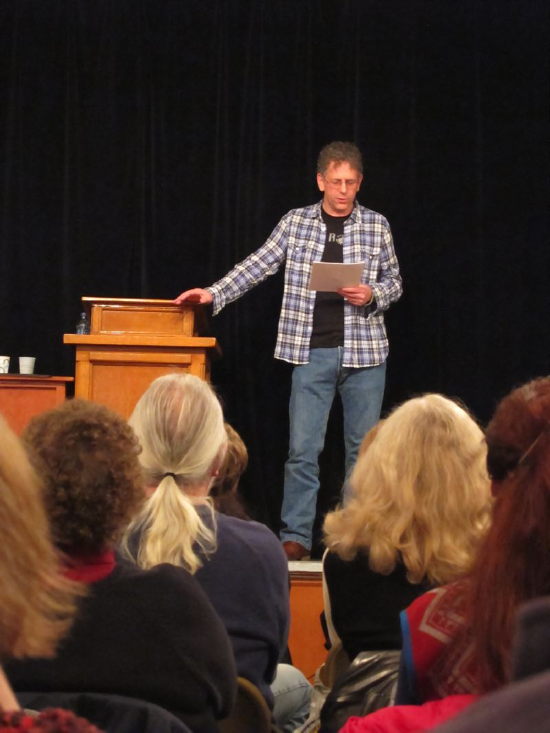
After the reading, there was a huge party at Stevan’s house, as there is every year. When I say it was a terrific time, that’s true. When I say I regret starting a fight and stabbing a guy, that’s not. But feel free to spread the rumor. I’ve got a book to promote, and I could use the buzz.
Thanks to Juliet Zulu for the production still at Club Rogue, and fellow writer and previous Grange-reader Steve Denniston for the shot of me at the podium.
_________

Say it takes you an hour to drive through rural Oregon to the Springwater Grange. Say you've been waiting for this all your life. Roll down the window and play this fucking loud. Steve Earle, "Feel Alright."
Posted in Trains | Wire to Wire | Writing
Louder
Next weekend I’m reading an excerpt from Wire to Wire at the Springwater Grange in Estacada, Oregon. It’s a big room, and I’ve been practicing for it, working on getting it loud.
I can do loud, but I don’t do it naturally. My speaking voice is normally a little bit quiet. In fact, a long time ago I adopted the line from the B-side song “The Quiet One” by The Who: I ain’t quiet – everybody else is too loud. (For younger readers, The Who are an a cappella group from Leeds, known for their delicate harmonies.)
On the other hand, when I started learning fiction, my writing voice was the opposite of my speaking voice: I always wanted the writing to be loud. A blast of voice is how I would describe my early style now, though at the time I called it incantatory – because I had read that Kerouac and Joseph Conrad, both of whom I liked, were incantatory writers. I wanted sentences that went on for pages, doubled back on themselves, and emptied the bench of every punctuation mark known to man, especially semi-colons. Dashes were good too.
Of course, I was doing this at about the same time Raymond Carver was revitalizing the short story with short, direct sentences that displayed exactly the opposite signal to noise ratio. (In Carver’s case, all signal, no noise.) My allegiance to the sound of a sentence (caring more about how the syllables fell than the story being told, would be a harsh way of putting it) might have been an early warning sign of the long road ahead. But I wasn’t deterred.
In fact, I once sent a friend an unmarked cassette tape with a message, written in Sharpie, probably in all caps, that said: “This is how I want my writing to sound.” On the tape was an Elvin Jones drum solo. I bought some of his albums to listen to when I wrote.
(And I still have them. Filed under J right next to Joan Jett. Go ahead - imagine me as a vinyl aficionado if you like. It’s not really true, but I like the way aficionado sounds on the page. Which explains why I once changed my name to Johnny Revillagegado for a very brief time. But that’s a whole nother post, as we would say in Michigan.)
Eventually I finished a story built around voice. It opened like this:
It was a new time and we rode slam hard, rode it on flatcars and hoppers and bulkhead flats, in empty woodchip cars, gons, auto ramps, and piggies all over the west, the prairies and dirty western towns of district nine, Kalama, Lillooet, Sutter’s Portage, dozens of towns seen from the frame of a boxcar and eyes numb past blinking. Towns of dust where dirty kids threw rocks at the train – in laziness, not maliciously – and empty towns on the straight flat where the last lit beer sign burned thirty miles into the night.
The story worked, sort of – it got published in a low-circulation newsletter – but soon I discovered the limitations of voice (like the problem of wearing the reader out). And I started reading Robert Stone. Since then I’ve read the opening sentence of Dog Soldiers about 7,000 times. “There was only one bench open in the shade and Converse went for it, although it was already occupied.” A setting, a character, and an action, all in 19 fairly quiet words. My admiration for that, and for the rest of the book, started me on a new path – one of looking beyond voice. Beyond loud.
_____
I would still be lost on that path today – wandering through the woods, eating acorns, clutching an unfinished manuscript for warmth – were it not for Stevan Allred and Joanna Rose. Stevan and Joanna teach writers in Portland at The Pinewood Table, named for the table in Joanna’s living room. I joined the group in the early 2000s, thinking I would stay for five weeks or so. I stayed for five years instead. I read every word of Wire to Wire around that table; the parts that puzzled me most (and there were lots of them) I read two or three times. If not for Stevan and Joanna and the other writers at the table (from whom I learned nearly as much) there would be no book, no blog, no readings. Among the many things I learned at that table was when and how to stop writing Wire to Wire.
Stevan and Joanna are both reading at the Grange this coming weekend – Stevan organizes the Writers Night event once a year. This year, the theme is "On the road." I’m thrilled to be reading there with them. I’ll be going to a lot of great bookstores this summer – places I’ve always dreamed of reading. But nothing could be more perfect than starting with Stevan and Joanna at the Springwater Grange in Estacada.
As far as I’m concerned, if you can make it there, you can make it anywhere.
____

Elvin Jones explains how to build a drum solo around the melody of "Three Card Molly."
Posted in Wire to Wire | Writing
This is not my book
Wire to Wire: Inside the 1984 Detroit Tigers Championship Season is not my book. Though in a way it is. This other Wire to Wire, written by George Cantor and published in 2004, chronicles the magical year when the Tigers opened the season with a 19-1 record.
Imagine it happening day by day. 19 wins. One loss. A few weeks later they were 35-5. During the first quarter of that season, the Tigers were virtually unbeatable. Argue great teams all you want, but based on that win-loss record, no team in baseball has ever been that good, before or since.
The Tigers won the pennant and the World Series wire to wire that year – meaning they were in first place every day of the season. Only two other teams had ever done that in over 100 years of baseball.
I took that as a freaking sign. I named my book after it. (Cantor's book, I might add, had not been written yet.)
Later, I wrote to Jesse Burkhardt about my decision to quit my job and write a book. Jesse is also Iron Legs Burk, who showed me how to hop freights. He saved the letter for a decade or two, and today he mailed it back to me.
.jpg)
To be clear, my Wire to Wire has nothing to do with baseball. The Tigers aren’t even mentioned. (Well, actually, there’s a little play by play in the background of one scene, an argument. If you read the book and you’re from Michigan, imagine the great Ernie Harwell calling the plays as Harp and Lane shout at each other.)
Stripped of the Tigers' connection, the phrase wire to wire had to find its own meaning in my story. And eventually it did. The necessity of discovering what it meant was a blessing I didn’t recognize at first.
The letter continues:

Near the end of the letter, the younger me also writes this to Jesse: “There’s a line in my book that says ‘we rode the rails and we kept going long after most people would have quit.’” That particular line is no longer in the book – the voice is wrong – but now it seems to apply as much to writing as it did to riding. I kept going. The strength came from a lot of people, Jesse and many others. It came from music, my family, from random good luck that fell on me for no reason – and even from a baseball team that, during one amazing year, simply couldn’t lose.
______
I’m part way through Cantor’s book, by the way, and if you’re a baseball fan, or a Sparky Anderson fan, I think you’d enjoy it. I also have a new phrase in my head – a phrase that still needs to find its meaning. I'm taking that as another good sign.
______
 In a world like this, you need a heart like Jon Dee Graham's. So you don't get "Faithless."
In a world like this, you need a heart like Jon Dee Graham's. So you don't get "Faithless."
Posted in Wire to Wire | Writing
Things to worry about, and having faith
When my son was one minute old, he taught me something about life. The nurse handed him to me and in those first few seconds, I felt relief. The months of anxiety were over. My naïve thought was: I can stop worrying now. I held onto that belief for as long as it took to exhale and draw in one breath. Then I realized my worries weren’t over. They were just beginning.
So I guess what I learned was: It never ends.
Zane’s eighteen now. Things have more or less worked out. Still, last night my wife woke up around midnight, worried that he didn’t have enough gas to get to school in the morning. I could hear rain hitting the window. I almost asked if she wanted me to go out and check the gauge. But I didn’t. Never ask a question you don’t want to know the answer to.
A manuscript is like a kid that way, at least for me. The day Tin House said they’d take my book, I thought I’d reached the finish line. Instead, there’s a whole new universe of things to obsess over. Should I be promoting it more? Am I tweeting too much? What if Tin House has changed their mind about publishing it? I haven’t heard from them in a while. Should I call them just to be sure? What about reviews? Should I even read them?
Last Sunday I finished Tom Grimes’ brilliant memoir, Mentor. It’s the story of Grimes’ life as a writer and his time at the Iowa Writers’ Workshop. Grimes’ mentor is Frank Conroy; their relationship is at the heart of the story. It’s an amazing book. Publishers Weekly gave it a starred review.
Initially, I thought the appeal of reading Mentor would be in seeing the path I didn’t take. At about the same time Grimes went to Iowa, I quit my day job, started freelancing and tried to teach myself to write fiction. I thought it would take five years. It took much longer.
But although those two paths are different, they have something in common. A writer’s life is irrational, as Grimes says Conroy says. And you inflict all sorts of crap on yourself along the way. Irrational worries. Twice I put the book down and said, that’s enough. It’s too close to the bone. The problem is, it’s not the kind of book you can stop reading.
When I finished Mentor on Sunday night, one gift it gave me was a sense of resolve. I promised myself not to let the world define Wire to Wire for me. Reviews don’t matter.
The world, being a kind and gentle place, let me hold onto that belief for almost 12 hours before outing me as a hypocrite. The next morning Publishers Weekly gave Wire to Wire a starred review and made it Pick of the Week.
So hold that thought. It turns out reviews do matter. As long as they’re good. As for my resolve not to read them…hey, revision is everything in writing. That includes revising my beliefs.
Somebody tell me if I’m tweeting too much, though.
_____
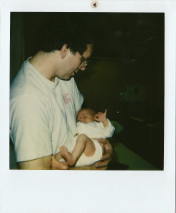
Sometimes you gotta lose it, just to lose it, just to find it again: Alejandro Escovedo says you gotta have “Faith.”
Posted in Wire to Wire | Writing
Riding the Ann Arbor
A postcard from my wife – well, she was my girlfriend at the time, and we had just finished our only freight ride together: hopping the Ann Arbor Railroad from southern Michigan to Frankfort, where Wire to Wire is set. (It’s called Wolverine in the book.) The 250-mile trip took 24 hours.
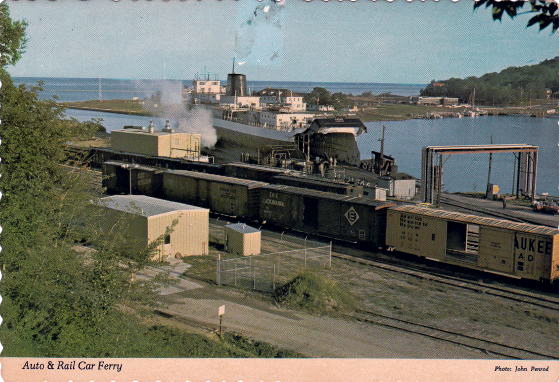

The postcard is to my parents. They knew we were hopping freight. They didn’t know about us getting caught when we tried to change cars at Whitmore Lake, or the ankle bracelet lost in a boxcar, or the angry engineer who threw us off the train in Owosso, or how we sat at an all-night donut shop with no idea what to do next until the young brakeman happened to come in and told us how to sneak back into the yards. Parents don’t need those kind of details. The note my girlfriend/wife wrote – that the trip was “easy and hard” – says it all.
Frankfort/Elberta is where the Lake Michigan railroad ferries dock. We spent a few nights sleeping on the beach and in the trailer my parents kept in a small camp up north, then rode the ferry to Wisconsin, where we ran into a lot more things that were easy and hard, and parted ways – but not for long – in Milwaukee.

The schematic is something Iron Legs Burk and I found in a locker years later in the abandoned engine house in Elberta. It was helpful in writing Wire to Wire in that it showed the dimensions of the ferries. And for the phrase, “twin screw,” which turns up in some dialogue. “The old twin screw.” Two propellers, that is.
___________
Sometimes love was a train and vice versa, but mostly it wasn't: "If Love Was A Train," by Michelle Shocked
Posted in Trains | Wire to Wire
Recent Posts
Archives
- December, 2017
- December, 2015
- January, 2015
- November, 2014
- April, 2014
- March, 2014
- December, 2013
- September, 2013
- July, 2013
- March, 2013
- January, 2013
- November, 2012
- October, 2012
- July, 2012
- May, 2012
- March, 2012
- February, 2012
- December, 2011
- November, 2011
- October, 2011
- September, 2011
- August, 2011
- July, 2011
- June, 2011
- May, 2011
- April, 2011
- March, 2011
- February, 2011
- January, 2011
- December, 2010
- ,
Categories
Links
- My Essay on Bloom: No Other Way Out
- Playlist in LargeHearted Boy
- A Book Brahmin Essay for Shelf Awareness
- Powell's Blog: Sex & Money
- Powell's Blog: Riding Freights
- Powell's Blog: Burning Down the House
- Powell's Blog: Bob Seger
- Powell's Blog: Thank You
- An Interview with Kathleen Alcala
- An interview with Laura Stanfill
- Video with Yuvi Zalkow
- Interview with Noah Dundas
- Tin House Blog: Motor City Fiction
- Blog on Occupy Writers
- W2W Essay for Northwest Book Lovers
- W2W Essay for Poets & Writers
- America Reads: Page 69
- America Reads: My book, the movie
- America Reads: What I'm Reading
- Interview with Be Portland
- The Oregonian: Where I Write
 Subscribe to the RSS feed
Subscribe to the RSS feed